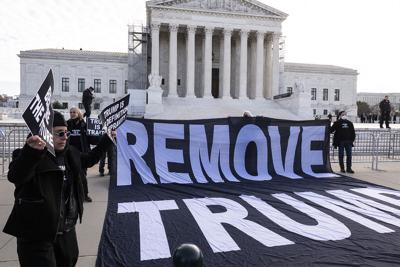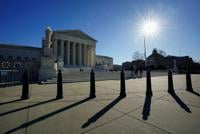WASHINGTON — The Supreme Court justices gave a favorable hearing to former President Trump on Thursday, suggesting they will clear the way for him to seek election this year despite the mob attack on the Capitol that followed his loss in 2020.
The justices, both conservative and liberal, said they were skeptical of giving states the authority to disqualify candidates for national office.
“Why should a single state make this determination for the rest of the nation?” asked Justice Elena Kagan. “It sounds awfully national.”
“It doesn’t seem like a state call,” added Justice Amy Coney Barrett.
In December, the Colorado Supreme Court became the first and so far only state or federal court to rule that Trump must be removed from the primary ballot because he is not qualified to hold office.
By a 4-3 vote, the state judges said Trump had violated Sec. 3 of the 14th Amendment which says no person may “hold any office, civil or military” after having taken an oath to support the Constitution and later “engaged in insurrection” against the United States.
During Thursday’s argument, the justices spent little time focusing on whether Trump’s action amounted to engaging in insurrection. But most of them questioned whether Colorado could decide on its own whether Trump was constitutionally disqualified from running for president again.
Chief Justice John G. Roberts Jr. said that other states “in very quick order” would make their own decisions on who can run for president, and some may seek to disqualify Democrats.
Justice Brett M. Kavanaugh repeatedly cited an 1869 decision which Congress had to pass a law to enforce the 14th Amendment’s disqualification rule. It was not up to each state, he said.
He noted that while federal law makes it a crime to “incite an insurrection,” Trump had not been charged under that law.
The tenor of Thursday’s argument suggests a solid majority of the court will rule for Trump and reverse the Colorado court’s decision.
Only Justice Sonia Sotomayor, the court’s most reliable liberal, sounded as though she would rule against Trump.
Legal scholars and historians told the justices in friend-of-the-court briefs that the words and history of the 14th Amendment call for disqualifying Trump. They said the members of the Reconstruction Congress were determined to prevent “insurrectionists” from gaining power and subverting American democracy.
They hoped this argument would resonate with the court’s conservatives, who often insist that the Constitution should be interpreted based on its text and original meaning.
But the six conservatives are also Republican appointees, and Trump’s lawyers said it would be “antidemocratic” to remove the most popular Republican from the ballot.
The former president is “the presumptive Republican nominee and the leading candidate for president of the United States,” Trump’s lawyers said in their closing brief filed on Monday. “The American people — not courts or election officials — should choose the next president of the United States. Yet at a time when the United States is threatening sanctions against the socialist dictatorship in Venezuela for excluding the leading opposition candidate for president from the ballot, ... [the Colorado lawsuit] asks this court to impose that same anti-democratic measure at home.”
The justices agreed to hear Trump’s appeal on a fast-track basis. They also may be in search of a convincing legal reason to overturn the Colorado ruling, but Trump’s lawyers raised mostly procedural or technical objections.
Their lead argument is that the president is not “an officer of the United States” and is therefore not covered by Section 3 of the 14th Amendment. They said officers are appointed, not elected, and the 14th Amendment does not mention the president or vice president.
Many historians and legal scholars call this claim absurd. It would mean the Reconstruction Congress sought to block ex-Confederates from holding “any office” across the nation except the presidency.
Secondly, Trump lawyers argued that the 14th Amendment disqualification clause can be enforced only through an act of Congress. They noted that federal law makes it a crime to “incite an insurrection,” but Trump has not been charged with that offense.
Their third argument may get traction with the court’s conservatives. In 1995, the Supreme Court struck down an Arkansas law that imposed term limits for members of Congress, and the court said then that states may not add new qualifications for federal office holders.
Citing that decision, Trump’s lawyers say Colorado is imposing a new qualification on candidates for president.
In defense of the state, attorneys for Colorado say their state judges are enforcing existing qualifications, not new ones.
Trump’s lawyers also contend the former president did not engage in insurrection.
“The events of Jan. 6 were not an ‘insurrection,’ as they did not involve an organized attempt to overthrow or resist the U.S. government,” they wrote. The mob attack on the Capitol “lasted only about three hours, most of the participants acted on the spur of the moment, few [if any] … carried firearms, and their objectives were narrow: to pressure Congress and the vice president to correct what they … thought were fraudulent election returns.”
The legal brief filed on behalf of the Colorado voters who brought the case included photos of the Jan. 6. attack on the Capitol.
“As president, Trump swore to preserve, protect, and defend the Constitution. He betrayed that oath. He refused to accept the will of the over 80 million Americans who voted against him. Instead of peacefully ceding power, Trump intentionally organized and incited a violent mob to attack the United States Capitol in a desperate effort to prevent the counting of electoral votes cast against him .... Section 3 is designed precisely to avoid giving oath-breaking insurrectionists like Trump the power to unleash such mayhem again.”















